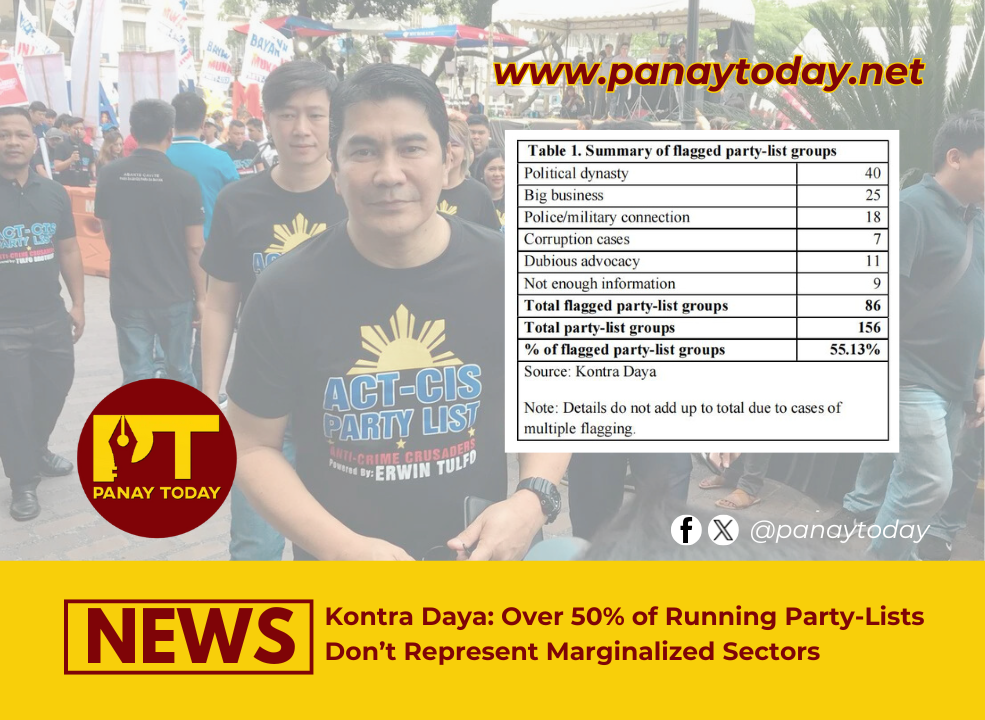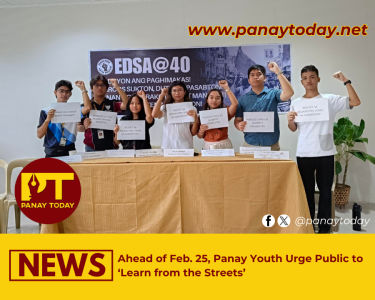By Juliane Judilla
Election watchdog Kontra Daya along with Center for People Empowerment in Governance (CenPEG), Inc. and Vote Report PH, revealed that more than half of the party-list groups participating in the 2025 elections do not represent the marginalized sectors they are intended to serve, in a media forum held at the University of the Philippines-Diliman, on Wednesday, February 12. The organization highlighted that many of these groups are linked to political dynasties, big businesses, or the military and police forces.
Kontra Daya’s monitoring of the December 2024 and January 2025 Social Weather Stations (SWS) surveys flagged seven prominent party-list groups that appear to be hijacking the party-list race. These groups – 4PS, ACT-CIS, Duterte Youth, Ako Bicol, FPJ Bantay Bayanihan, Tingog Sinirangan, and TGP – have raised concerns due to their connections to influential political clans, major business interests, or military affiliations.
Among the flagged party-list groups, 4PS is tied to the Abalos family, ACT-CIS is associated with the Tulfo and Yap clans, FPJ Bantay Bayanihan has links to the Poe Llamanzares family and Dolor and Paton families, Tingog Sinirangan is connected to the Romualdez family, and Ako Bicol has strong ties to the Sunwest conglomerate. TGP, meanwhile, is associated with Teravera, a contractor for the Department of Public Works and Highways (DPWH). Duterte Youth is flagged for its military connections, which have been linked to the group’s track record of red-tagging.
Kontra Daya’s analysis also sheds light on broader concerns about political dynasties’ dominance over the party-list system. The watchdog noted that political dynasties appear to be particularly entrenched in party-lists such as 4PS, ACT-CIS, and Tingog Sinirangan. For instance, ACT-CIS has successfully extended the influence of the Tulfo political clan from the Senate to the House of Representatives and beyond, including an appointed Cabinet position.
Of the 156 party-list groups running in the 2025 elections, Kontra Daya identified 86 groups that raised red flags for various reasons, including links to political clans, corruption cases, and dubious advocacy. These groups collectively represent 55.13% of the total party-lists, and it is evident that many do not reflect the interests of the marginalized and underrepresented populations they are supposed to advocate for.
Among the 1,500+ party-list nominees, Tingog Sinirangan, closely tied to the Romualdez clan, deserves special attention. The Romualdez family is closely associated with the current Speaker of the House, and their influence over the group warrants scrutiny. Similarly, the profiles of ACT-CIS nominees underscore the extent of the Tulfo family’s control over the party-list, demonstrating their tight grip on both the Senate and the House. The group’s connection to the Yap dynasty further amplifies concerns about its true advocacy.
In addition to concerns about political connections, Kontra Daya also highlighted that some party-list nominees have provided vague or incomplete information on their qualifications, offering only general details about their work without clarifying their specific contributions or positions. This raises questions about their true motivations and whether their nominations align with the principles of the party-list system.
Kontra Daya also warned the public to scrutinize all ten nominees of each party-list group, as there have been instances where individuals from political dynasties have been placed at the bottom of the nominee list.
“It is also possible for members of political clans, including incumbent party-list representatives, to be listed not in the top three nominees but in the bottom numbers. This should be a reminder to the public to scrutinize all 10 party-list nominees and not just the three,” Dr. Danilo Arao of Kontra Daya said.
As the 2025 elections approach, Kontra Daya urges voters to remain vigilant and ensure that the party-list system serves its original purpose: to amplify the voices of the marginalized, rather than those of powerful political dynasties and corporate interests.
“Let us continue to prepare, stay vigilant, and take action because in these times, it is no longer enough to just vote in the name of the election. We still need to critically examine what is happening around us,” Arao added./PT





